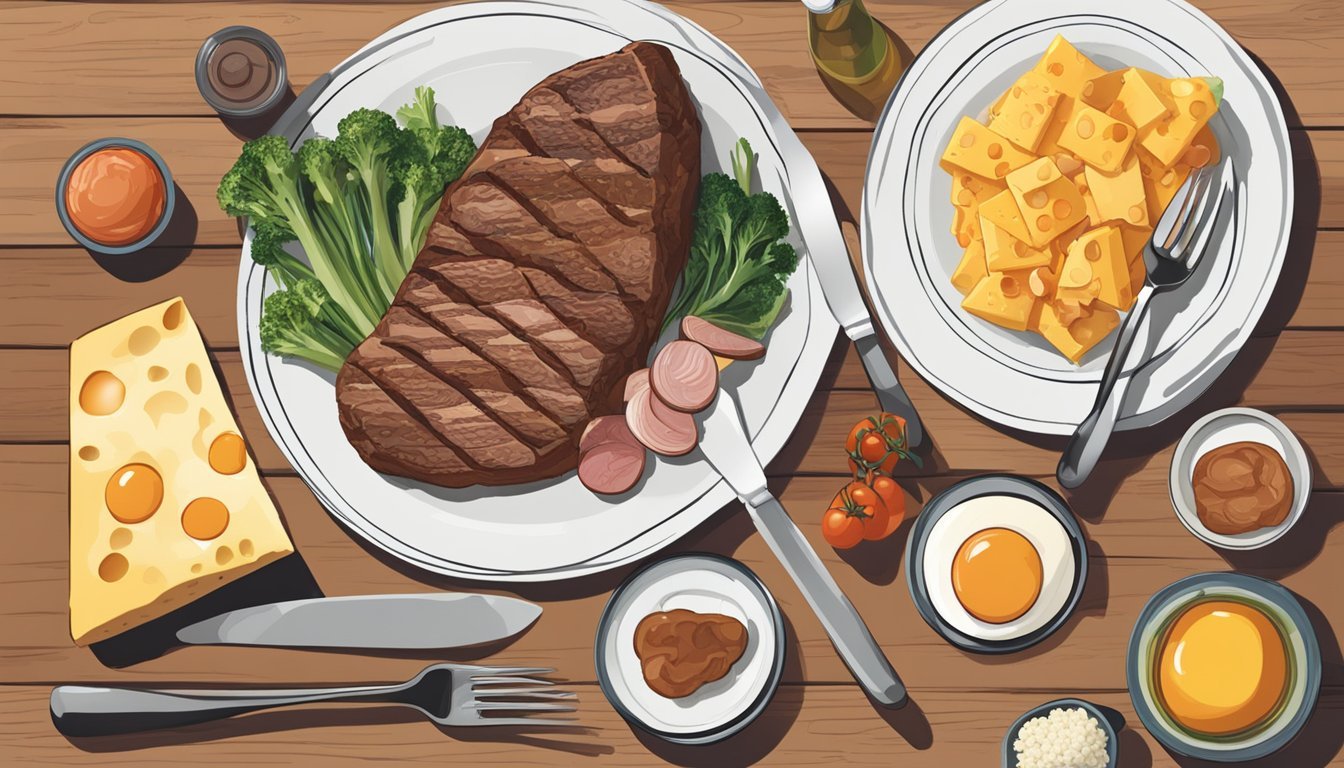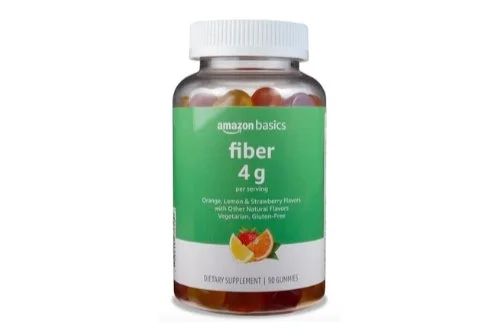Sucralose on Carnivore Diet
Impact and Considerations
The carnivore diet emphasizes the consumption of animal products and eschews foods derived from plants. Its advocates often attribute various health benefits to this way of eating, from weight loss to reduced inflammation. A point of contention, however, arises when considering the inclusion of non-caloric artificial sweeteners, such as sucralose. Used to provide sweetness without the associated calories and carbohydrates of sugar, sucralose is a popular choice in low-carb and ketogenic diets but remains controversial in carnivore circles.
Sucralose, sold under the brand name Splenda among others, is a zero-calorie artificial sweetener that many turn to as a sugar substitute. While it offers the sweet taste many desire, there is debate about its place in a diet that is strictly animal-based. Proponents of the carnivore diet argue that all nutritional needs can be met from animal products alone, and thus, any additives, particularly those that are plant-derived or chemically altered, should be avoided. Concerns about sucralose include its effect on insulin levels, glucose metabolism, and gut health, which are crucial considering the diet's aim to optimize such physiological processes.
Artificial sweeteners like sucralose are often avoided by strict adherents to the carnivore diet due to potential insulin responses and other implications for metabolic health. There is also a discussion about whether artificial sweeteners might provoke sugar cravings or alter calorie intake, which is at odds with the principles of the carnivore diet. Ultimately, individuals following the carnivore diet must weigh the purported benefits of including sucralose in their regimen against the philosophy and goals of their dietary choices.
Understanding Sucralose
Sucralose is a zero-calorie artificial sweetener that has become a common substitute for sugar in many products. It offers a sweetness profile that mimics sugar, which makes it a popular choice in various diet plans, though it does pose health considerations that are important to understand.
Chemical Properties and Production
Sucralose, a chlorinated sucrose derivative, is created through a multi-step chemical process that selectively substitutes three chlorine atoms for three hydroxyl groups on the sucrose molecule. This alteration significantly enhances its stability and sweetness.
Production process:
Sucrose is used as the starting substance.
Chlorination by adding chlorine atoms.
Purification to isolate the final product, sucralose.
The chemical structure of sucralose is such that it is not metabolized by the body for energy, resulting in a sweetener that contributes no calories to the diet. This stability also allows it to withstand high temperatures, making it suitable for use in cooking and baking.
Sweetness Profile Compared to Sugar
When comparing sucralose to sugar, it's important to note the significant difference in sweetness intensity. Sucralose is approximately 600 times sweeter than sucrose (table sugar). This increased sweetness allows for much smaller quantities to be used in sweetening products.
Basic sweetness comparison:
Table Sugar (Sucrose): 1x sweetness
Sucralose: 600x sweetness
Although sucralose provides a sugary taste, it does not contribute to the sugar content of a diet, meaning it can be labeled as sugar-free. Its use in a variety of products aims to reduce the overall caloric intake while maintaining sweetness. However, individuals may need to consider the potential health risks associated with artificial sweeteners, including sucralose, which could impact glucose metabolism and insulin response, though research on these effects continues to develop.
The Carnivore Diet
The Carnivore Diet centers around consuming exclusively animal products and excludes all plant-based foods. It hinges on the premise that ancient humans thrived on a meat-heavy diet.
Core Principles
The core tenet of the Carnivore Diet is the exclusion of all plant-based foods, positing that an all-animal product diet can satisfy all nutritional needs. Proponents believe that the diet mimics that of early humans and consider it a return to a more primal eating pattern.
Typical Food Items
Meats: Beef, pork, lamb, game
Poultry: Chicken, turkey, duck
Fish and Seafood: Salmon, mackerel, shrimp
Eggs: Chicken, duck, quail
Dairy: Cheese and butter (limited)
Organ Meats: Liver, kidney, heart
Potential Health Benefits
Adherents claim improvements in digestion and weight loss due to the high protein and low carbohydrate content. The diet emphasizes nutrient-dense organ meats, potentially leading to a sufficient intake of vitamins and minerals that are essential for health.
Common Criticisms and Concerns
Critics argue that the Carnivore Diet lacks fiber and vital phytonutrients found in vegetables and fruits, possibly leading to long-term health risks. Concerns also include the environmental impact of a meat-centric diet and the potential for an increased risk of heart disease due to high saturated fat intake.
Buying fiber supplement online means you can shop at your own pace!
Impacts of Sucralose on Health
In assessing the impact of sucralose on health, especially within the framework of a carnivore diet, it's imperative to explore its effects on gut microbiome, insulin response, and potential risks.
Sucralose and Gut Microbiome
Sucralose has been associated with alterations in the gut microbiome. Research indicates that it may disrupt the balance of beneficial and harmful bacteria in the gut. This imbalance, known as dysbiosis, is linked to a range of health concerns, including obesity and gastrointestinal issues. A study investigating the effects of a ten-week sucralose consumption on the gut microbiome found notable changes that could influence overall gut health.
Insulin Response and Blood Sugar Levels
The insulin response and blood sugar levels are critical to managing diabetes and maintaining metabolic health. While sucralose is a non-caloric sweetener, research suggests it may affect the body's glucose and insulin metabolism. This sweetener, derivatives from sucrose, may alter how insulin and blood glucose levels are regulated, impacting those particularly concerned with insulin resistance and blood sugar management.
Risks and Potential Side Effects
While many people consume sucralose for its calorie-free sweetness, there are considerations regarding long-term health impacts. Consumer reports and emerging studies have sometimes associated the long-term use of sucralose with an array of potential side effects, raising concerns about cancer, heart disease, and other health risks. It is important to approach the inclusion of sucralose in any diet, including a carnivore diet, with awareness of these potential risks. However, definitive conclusive evidence linking sucralose to these serious health outcomes is currently lacking, necessitating further research.
Sucralose Use in a Carnivore Diet
The carnivore diet typically excludes non-animal sourced products, including artificial sweeteners, but some individuals consider incorporating sucralose as a sugar-free option for its negligible caloric content and sweet taste.
Compatibility with Carnivore Principles
On a carnivore diet, the focus is on consuming animal products exclusively. Sucralose, an artificial sweetener, does not align with the foundational rules of the diet, which exclude plant-derived substances and artificial additives. Proponents of the carnivore diet argue that for a diet to be authentically carnivore, one must consume only meat, animal fats, and sometimes dairy, sticking to foods that are minimally processed and do not include synthetic components like sucralose.
Possible Effects on Weight and Metabolism
The impact of sucralose on weight and metabolism is a topic of debate. While it is calorie-free and could theoretically assist in weight loss or maintenance within a carnivore diet, some studies point toward a potential for increasing sugar cravings and influencing insulin response. This could counteract the benefits of a carnivore diet, especially for those seeking to manage obesity through dietary changes. Moderation is key, as the individual metabolic response to sweeteners can vary.
Alternatives and Considerations
Those on a carnivore diet seeking to add sweetness without using sucralose have limited options, as traditional sweeteners are plant-based. Animal-derived products such as milk can offer some natural sweetness. It's essential to consider that the use of any sweeteners may dilute the purity of the carnivore diet and could confound its potential benefits. Therefore, it is encouraged to evaluate the necessity and purpose of adding sucralose or any sweeteners to an otherwise strict carnivore regimen.
Dietary Considerations
When examining sucralose's role in a carnivore diet, one must consider its potential impact on cravings, caloric intake, and whether it aligns with the incorporation of non-meat items into this dietary pattern.
Impact on Cravings and Taste Perception
Sucralose, a non-nutritive sweetener, may influence an individual's taste preferences by maintaining a desire for sweet flavors. The carnivore diet typically excludes sweet-tasting foods, suggesting that the use of sucralose could potentially counteract the diet's intention to reduce sugar cravings.
Flavor moderation is vital, as the regular consumption of sucralose could possibly lead to a heightened preference for sweet tastes, making it more challenging for individuals to adhere strictly to the savory palate of the carnivore diet.
Caloric Intake and Energy Source
Sucralose contains no calories and does not provide an energy source, which is an important consideration for a diet where energy typically comes from proteins and fats. Individuals on a carnivore diet gain their caloric intake predominantly from meat, fish, eggs, and certain dairy products.
Inclusion of zero-calorie sweeteners like sucralose in beverages such as tea or diet sodas suggests a possibility for individuals to feel they can indulge in sweet flavors without impacting their total daily caloric intake, though this might indirectly affect overall energy levels and dietary satisfaction.
Incorporating Non-Meat Items
The carnivore diet is marked by its exclusion of plant-based foods, which includes vegetables, fruits, nuts, and traditionally most sweeteners. Despite sucralose being derived from sugar, it undergoes a process that alters its form, rendering it carbohydrate-free.
Integrating sucralose may cater to those seeking to introduce a sweet taste without adding carbs, but one needs to contemplate whether it truly fits within the scope of a meat-only dietary paradigm. It is imperative for individuals on the carnivore diet to discern whether the introduction of any non-meat item aligns with their personal dietary goals and philosophies.
Regulations and Recommendations
When considering sucralose within the carnivore diet, it is essential to be aware of the daily intake guidelines set by reputable health authorities and to understand the research and position held by the Food and Drug Administration (FDA) on artificial sweeteners.
Daily Intake Guidelines
The FDA, alongside other international health organizations, has established an Acceptable Daily Intake (ADI) for sucralose. The ADI is defined as the amount per kilogram of body weight that one can consume daily over a lifetime without any associated health risks.
Acceptable Daily Intake for Sucralose: 5 milligrams per kilogram of body weight per day (mg/kg/day)
This ADI is based on numerous studies and is designed to be significantly lower than the smallest amount that might cause health issues, providing a wide margin of safety.
Research and FDA Position
The FDA's position on sucralose, based on over 100 safety studies, is that it is safe for use in food and beverages. To date, they have not found any evidence that sucralose, as well as other FDA-approved artificial sweeteners like aspartame, saccharin, and stevia, cause health issues when consumed within the established ADI.
FDA-Approved Sweeteners and Their Status:
Sucralose: Approved based on safety studies; widely used in various food products.
Aspartame: Approved with an ADI of 50 mg/kg/day; not suitable for individuals with phenylketonuria (PKU).
Saccharin: Approved but had a warning label requirement removed in 2000 due to lack of evidence for causing cancer in humans.
Stevia: Approved as a dietary supplement and considered Generally Recognized As Safe (GRAS) as a sweetener.
Researchers and regulatory authorities maintain ongoing surveillance to ensure continued safety, adapting regulations if new, credible research indicates a need for change.
Personalizing Your Diet
Incorporating sucralose into a carnivore diet requires a tailored approach that considers an individual's unique response and health goals. Personalization is key in maintaining health, managing weight, and preventing conditions like type 2 diabetes.
Monitoring Individual Response
One's body can react differently to artificial sweeteners like sucralose. They should closely observe their own reactions, noting any changes in:
Cravings: Increased cravings for sweets could indicate a spike in insulin levels.
Weight: Unexpected weight gain might be a sign that sucralose is affecting their diet negatively.
Tracking these responses helps in deciding if sucralose aligns with their dietary objectives.
Adjusting for Health Goals and Conditions
When personalizing their carnivore diet with sucralose, individuals must align their intake with specific health goals. For those with type 2 diabetes or insulin resistance, it's important to ensure sucralose doesn't adversely affect blood glucose levels. Here's how they can adjust their diet:
Weight Management: Limit sucralose if it contributes to increased caloric intake.
Diabetes Control: Check blood sugar levels to see if sucralose alters glucose or insulin.
Consulting with Healthcare Professionals
Before making any significant dietary changes, including the use of sucralose, it's advisable for individuals to consult with healthcare professionals. They can provide personalized advice, especially regarding:
Diet's Impact on Health: Understanding how sucralose may affect an existing health condition.
Insulin and Blood Glucose Monitoring: For those at risk of diabetes, professionals can guide them on how to monitor their insulin and glucose levels effectively.
Always seek professional guidance to ensure their diet supports their health and wellness goals.
Conclusion
Sucralose is an artificial sweetener that individuals on a carnivore diet might consider incorporating as a way to sweeten their beverages or food without adding carbohydrates or calories. However, it is critical to be aware that sucralose might trigger increased caloric intake or sugar cravings in some individuals, potentially impacting the diet's results.
The carnivore diet, which focuses exclusively on animal products, typically excludes items such as artificial sweeteners by default. Yet, health considerations are paramount when altering one’s diet, and any addition should be carefully evaluated.
Health Implications: Adding substances like sucralose to a carnivore diet could carry unknown health risks, as the diet's long-term effects are not fully understood.
Purity of Diet: Those strictly adhering to a carnivore diet may opt to avoid sucralose to maintain the diet's integrity.
Results: There is no clear evidence that sucralose interrupts the outcomes sought from a carnivore diet, but individual responses may vary.
Individuals should consult healthcare providers to understand the full implications of sucralose intake. They should also listen to their bodies and monitor their responses to such additives. Tailoring the carnivore diet to one's personal health goals is crucial, and what works for one person may not work for another.









